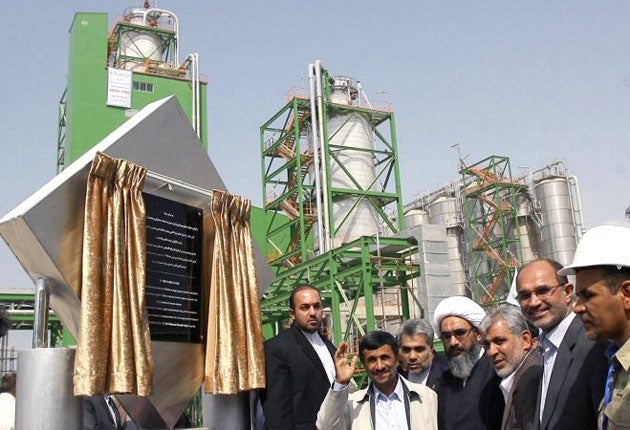Mousavi attacks 'evil conspiracy'
Opposition leader challenges Supreme Leader over his support for Ahmadinejad

Iran's opposition leader, Mirhossein Mousavi, refused to back down in his confrontation with the country's rulers yesterday, declaring: "It is a must for us to neutralise this evil conspiracy through our behaviour and expressions."
Mr Mousavi's defiant statement came the day after violent clashes in the centre of Tehran, with demonstrators defying Ayatollah Ali Khamenei's demand to cease the protests which followed election results that gave President Mahmoud Ahmadinejad a landslide victory. Police used tear gas and there were reports of running street fights. The government said that as well as 17 protesters, eight members of the Islamist Basij militia, which has gained a notorious reputation for brutality against demonstrators, have been killed in the violence. The claims could not be verified because of the reporting restrictions imposed in the country.
According to the authorities, Mr Ahmadinejad won 62.6 per cent of the votes compared to 33.75 per cent for Mr Mousavi. However only 105 out of 290 members of the Iranian parliament attended a victory part for the President. Neither Ali Larijani, the highly influential Speaker, or his deputy, Mohammed Reza, attended the event, leading to speculation of splits within the ruling establishment.
The combative stance taken by Mr Mousavi, in which he appeared to indicate that he had decided to back the protests to the bitter end, may have been influenced by the belief that support for Mr Ahmadinejad may be slipping among the ruling elite.
However, the opposition leader appeared to have embarked on the high-risk strategy of directly challenging Ayatollah Khamenei, saying "The Supreme Leader's support for the government in normal conditions would be useful, but the impression of his identification with the President is not for the benefit of the country."
Writing on his website, Mr Mousavi said the result of the polls was a "big fraud" and that the security forces had "attacked protesters inhumanely, killed, injured or arrested them". He continued: "I am willing to show how election criminals have stood by those behind the recent riots and shed peoples' blood. I will not back down even for a second, even for personal threats or interests."
There had been reports earlier in the week that Mr Mousavi's wife, Zahra Rahnavard, had been arrested after posting a message on her husband's website in which she said the protests must continue despite the authorities imposing regulations that she likened to martial law. There has been no further news about her whereabouts.
The authorities meanwhile continued their policy of cracking down on protest, arresting 70 university professors after they had met Mr Mousavi to discuss setting up a more liberal form of government. Later at least half of them were released, but some remain in custody. Other academics, artists, writers, poets and journalists have all been particularly targeted for harassment and detention.
Yesterday, the parents of a British-Greek journalist who had been arrested on charges of "underground activities" in Tehran called for their son to be freed. Jason Fowden, also known as Iason Athanasiadis, a freelance writer for a number of British publications, was held at the airport.
His Greek mother, Polymnia Athanasiadi, and British father, Georgios Fowden, said their son had "always maintained his integrity as an independent journalist. Our son's work serves no purpose other than the fair and humane coverage of life in the many countries where he has worked."
The Committee to Protect Journalists estimates that 40 journalists have been arrested as part of the post-election crackdown. Among them were 25 employees of Kalameh Sabz, a reformist newspaper owned by Mr Mousavi, the offices of which were raided on Monday.
Iran's most senior dissident cleric, Ayatollah Hossein Ali Montazeri, warned the authorities in a statement that trying to stamp out dissent would prove futile. If people are not allowed to voice their demands in peaceful gatherings, it "could destroy the foundation of any government", regardless of its power, he wrote in a blog.
Ayatollah Montazeri was the heir apparent to the late Ayatollah Ruhollah Khomeini until falling out of favour with the ruling clerics by questioning their almost limitless powers. He spent five years under house arrest.
The G8 summit, which is supposed to work out a common international policy towards Iran, is facing diverging views. Russia had already stated that the election result should stand and there was little surprise when Foreign Minister Sergei Lavrov said that it was wrong to isolate Iran.
The British Foreign Secretary, David Miliband, said the outside world should not be blamed for the troubles in Iran. "The truth is that there is a crisis of credibility between the Iranian government and their own people. It's not a crisis between Iran and America or Iran and Britain, however much the Iranian government wants to suggest that."
The Italian government said it hoped thatyesterday's meeting of the Group of Eight foreign ministers would send a "tough" message to the regime.
However, Swedish Prime Minister Fredrik Reinfeldt, whose country is set to take over the EU presidency next week, cautioned against European sanctions towards Iran, saying they could be counterproductive.
Join our commenting forum
Join thought-provoking conversations, follow other Independent readers and see their replies
Comments
Bookmark popover
Removed from bookmarks